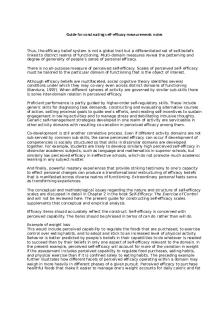Codelfa Construction Casebrief PDF

| Title | Codelfa Construction Casebrief |
|---|---|
| Course | Contracts |
| Institution | Macquarie University |
| Pages | 1 |
| File Size | 73.9 KB |
| File Type | |
| Total Downloads | 88 |
| Total Views | 150 |
Summary
Download Codelfa Construction Casebrief PDF
Description
Codelfa Construction Pty Ltd v State Rail Authority of New South Wales (1982) 149 CLR 337 Name of Case
Codelfa Construction Pty Ltd v State Rail Authority of New South Wales (1982) 149 CLR 337
Citation and Court
High Court of Australia
Material Facts
The state rail authority (SRA) accepted Codelfa’s tender in relation to excavation work required for the construction of the Eastern Suburbs Railway. Construction of the railway was authorized by statute, which included a provision granting the SRA immunity from prosecution for nuisance. The parties agreed that Codelfa was to complete its work within 130 weeks from commencement. It was expressly agreed that Codelfa would bear all necessary costs for the work at an agreed price, regardless of the difficulties it might encounter. In order to complete on time, Codelfa calculated it would need to work three eight hour shifts per day for six days per week, with certain work on Sundays as well. However, local residents obtained an injunction against Codelfa, which mistakenly assumed it was protected by the SRA’s statutory immunity. This meant that work could not proceed between 10pm and 6am on the six days or at all on Sundays. The SRA refused Codelfa’s claim for additional costs. Whether there were grounds upon which to imply a term into the contract granting Codelfa further time to complete and requiring the SRA to indemnify Codelfa against additional costs incurred. Implied Terms in Contracts Failed to argye that the implied term goes without saying, if one of the five terms is not met then you cannot argue that it is implied terms
Legal Issue
Relevant Law Application of Law to the Facts
Mason J held that “Codelfa’s case is that a term has to be implied in the contract to give it business efficacy, to make it workable” “Courts are slow to imply a term. In many cases, what the parties have actually agreed upon represents the totality of their willingness to agree, each may be prepared to take his chance in relation to an eventuality for which no provision is made.” “It is not enough that a term may be rasonable to imply, it must be necessary to do so to give business efficacy to the contract, as found by Mackinnon LJ in Shirlaw v Souther Foundries (1926) “Prima facie that which an y contract is left to be implied and need not be expressed is something so obvious that goes without saying.” Conditions necessary to grount the implications of a term are seen in BP Refinery (Westernport Pty Lrd v Hastings Shire Council 1. It must be reasonable and equitable 2. It must be necessary to give business efficacy to the ontract, so that no term will be implied if the contract is effective without it 3. It must be so obvious that “it goes without saying” 4. It must be capable of clear expression 5. It must not contradict any express term of the contract The contract between Codelfa and SRA does not satisfy the terms above, that is, even without the immunity, Codelfa is able to continue its contract and finish the contract. So, the injunction need not be removed and the immunity need not be granted. It also did not go without saying to extend immunity of SRA to Codelfa.
Conclusion
On the issue of implied terms, the High court held unanimously that there was no basis upon which to imply any terms arising from the grant of the injunction....
Similar Free PDFs

Codelfa Construction Casebrief
- 1 Pages

Casebrief
- 4 Pages

Codelfa True Rule - Grade: D
- 10 Pages

Ship Construction
- 377 Pages

Scale construction
- 5 Pages

Underwater construction
- 38 Pages

construction metallique
- 118 Pages

Social construction
- 10 Pages

Harmonious construction
- 11 Pages

Hospital construction
- 14 Pages

Luo construction
- 11 Pages

Construction Methodology
- 14 Pages

Port construction
- 41 Pages
Popular Institutions
- Tinajero National High School - Annex
- Politeknik Caltex Riau
- Yokohama City University
- SGT University
- University of Al-Qadisiyah
- Divine Word College of Vigan
- Techniek College Rotterdam
- Universidade de Santiago
- Universiti Teknologi MARA Cawangan Johor Kampus Pasir Gudang
- Poltekkes Kemenkes Yogyakarta
- Baguio City National High School
- Colegio san marcos
- preparatoria uno
- Centro de Bachillerato Tecnológico Industrial y de Servicios No. 107
- Dalian Maritime University
- Quang Trung Secondary School
- Colegio Tecnológico en Informática
- Corporación Regional de Educación Superior
- Grupo CEDVA
- Dar Al Uloom University
- Centro de Estudios Preuniversitarios de la Universidad Nacional de Ingeniería
- 上智大学
- Aakash International School, Nuna Majara
- San Felipe Neri Catholic School
- Kang Chiao International School - New Taipei City
- Misamis Occidental National High School
- Institución Educativa Escuela Normal Juan Ladrilleros
- Kolehiyo ng Pantukan
- Batanes State College
- Instituto Continental
- Sekolah Menengah Kejuruan Kesehatan Kaltara (Tarakan)
- Colegio de La Inmaculada Concepcion - Cebu


